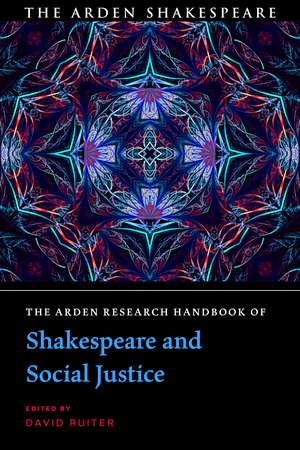The Arden Research Handbook of Shakespeare and Social Justice: The Arden Shakespeare Handbooks
Editat de Dr David Ruiteren Limba Engleză Hardback – 25 noi 2020
| Toate formatele și edițiile | Preț | Express |
|---|---|---|
| Paperback (1) | 183.55 lei 3-5 săpt. | |
| Bloomsbury Publishing – 13 iul 2022 | 183.55 lei 3-5 săpt. | |
| Hardback (1) | 951.68 lei 6-8 săpt. | |
| Bloomsbury Publishing – 25 noi 2020 | 951.68 lei 6-8 săpt. |
Preț: 951.68 lei
Preț vechi: 1368.76 lei
-30% Nou
Puncte Express: 1428
Preț estimativ în valută:
182.10€ • 198.43$ • 153.45£
182.10€ • 198.43$ • 153.45£
Carte tipărită la comandă
Livrare economică 23 aprilie-07 mai
Preluare comenzi: 021 569.72.76
Specificații
ISBN-13: 9781350140363
ISBN-10: 1350140368
Pagini: 352
Dimensiuni: 156 x 234 mm
Greutate: 0.66 kg
Editura: Bloomsbury Publishing
Colecția The Arden Shakespeare
Seria The Arden Shakespeare Handbooks
Locul publicării:London, United Kingdom
ISBN-10: 1350140368
Pagini: 352
Dimensiuni: 156 x 234 mm
Greutate: 0.66 kg
Editura: Bloomsbury Publishing
Colecția The Arden Shakespeare
Seria The Arden Shakespeare Handbooks
Locul publicării:London, United Kingdom
Caracteristici
Offers a global and holistic sense of how Shakespearean themes can be applied and amplified within varied, cosmopolitan, contemporary contexts
Notă biografică
David Ruiter is currently appointed as Faculty Director of the Teaching + Learning Commons at the University of California, San Diego, USA. He has written on issues of hospitality, intersectionality, translation, globalism and civic theatre, as related to Shakespeare. His teaching has focused on Shakespeare, the history of literary forms, world literature and detective fiction.
Cuprins
List of IllustrationsNotes on ContributorsSeries PrefaceAcknowledgementsIntroduction: "This Is Real Life: Shakespeare and Social Justice as a Field of Play", David Ruiter (University of Texas at El Paso)Part One: The Shakespeare and Social Justice Interviews 1.1."Deconstructing Social Hierarchies: Interviews", Erin CoulehanChris Anthony (Assistant Professor of Acting at DePaul University, Chicago, USA)Erika Whyman (Deputy Artistic Director at the Royal Shakespeare Company, UK)Arthur Little (Associate Professor, English, UCLA) Ewan Fernie (Professor at the Shakespeare Institute, University of Birmingham, UK, and Director of the 'Everything to Everybody' Project, UK)Farah Karim-Cooper (Professor of Shakespeare Studies at King's College London, UK, and Head of Higher Education and Research at Shakespeare's Globe, UK)Part Two: The Practice of Shakespeare and Social Justice 2.1. "Active Shakespeare: A Social Justice Framework" Ayanna Thompson (Arizona State University) and Laura Turchi (University of Houston, USA)2.2. "Bending Toward Justice: From Shakespeare's Black Mediterranean to August Wilson's Black Atlantic", Peter Erickson (Northwestern University, USA) 2.3."Black Hamlet, Social Justice, and the Minds of Apartheid", Arthur Little (UCLA, USA) 2.4."Shakespeare and Civil Rights: Rhetorical Universalism", Jason Demeter (Norfolk State University, USA)2.5."Shakespeare's Disabled, Disabled Shakespeare", Adelle Hulsmeier (University of Sunderland, UK) 2.6."Social Justice in the Academy: Reflecting on Shakespeare's Royal Women", Christie Carson (Royal Holloway, University of London, UK)Part Three: The Performance of Shakespeare and Social Justice3.1."William Shakespeare's Enrique IV, Primera Parte: Common [Battle]Grounds between Medieval England and Mexico's Present", Alfredo Modenessi (National University of Mexico) and Paulina Morales (National University of Mexico) 3.2. "King Lear and Gender Justice in India", Preti Taneja (Newcastle University, UK) 3.3."Re-enacting Hamlet in South Africa", Malcolm Cocks (Shakespeare's Globe, UK) 3.4."'Shakespeare in Prison': A South African Social Justice Alternative", Kevin Quarmby (The College of St. Scholastica)3.5."Romeo and Juliet with Chinese Characteristics: Questions of Usefulness and Engagement in 21st Century China", Julie Sanders (Newcastle University) and Li Jun (University of International Business and Economics)3.6."Social Justice, Social Order and Political Power in NTCC's Adaptation of Richard III", Chee Keng Lee (Yale-NUS College)Part Four: The Economies of Shakespeare and Social Justice4.1."The Empathetic Imagination and the Dream of Equality: Shakespeare's 'Poetical Justice'", Kiernan Ryan (Royal Holloway, University of London, UK)4.2."The Idea of Communism in Shakespeare", Peter Holbrook (University of Queensland, Australia)4.3."'Leftward Ho!': Shakespeare and Lenin in the Tempest of Class Politics", Jeffrey Butcher (College of Coastal Georgia)4.4."The Visible and the Invisible: Shakespeare and the Question of Social Justice in King Lear", Geraldo de Sousa (University of Kansas, USA) Annotated BibliographyIndex
Recenzii
A rich and comprehensive resource . The combination of critical insights and practical takeaways makes this Arden resource a must-read for all who are interested in how Shakespeare can be meaningfully used in service of social justice projects.
This progressive and encouraging collection really does assume that Shakespeare's plays, like the players whom Hamlet welcomes to Elsinore, are 'the abstracts and brief chronicles of the time' - of our own times. I hope these essays continue a range of on-going conversations about justice, inclusion, diversity, fairness, and, yes, kindness.
A valuable and necessary introduction to a variety of ongoing convergences between Shakespeare studies and the discussion and practices of social justice. It is a fascinating and groundbreaking collection of interviews and essays by noted scholars, writers and practitioners of the arts that explores the significance of Shakespeare's oeuvre in the contexts of specific social issues.
This progressive and encouraging collection really does assume that Shakespeare's plays, like the players whom Hamlet welcomes to Elsinore, are 'the abstracts and brief chronicles of the time' - of our own times. I hope these essays continue a range of on-going conversations about justice, inclusion, diversity, fairness, and, yes, kindness.
A valuable and necessary introduction to a variety of ongoing convergences between Shakespeare studies and the discussion and practices of social justice. It is a fascinating and groundbreaking collection of interviews and essays by noted scholars, writers and practitioners of the arts that explores the significance of Shakespeare's oeuvre in the contexts of specific social issues.






